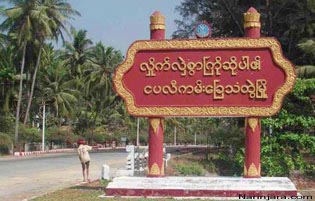Thandwe: The town of Thandwe in southern Arakan State, home of the famous sea beach Ngapali, has more expensive electricity than other cities in Burma. However, authorities are preparing to reduce the cost of electricity from 550 kyat to 400 kyat per unit starting in June, after people clamored against the high prices in their area.
 A hotel manager in the town said the Thandwe Township administrator announced during a meeting that the price of electricity would be reduced in Thandwe starting next month to ease the burden on people.
A hotel manager in the town said the Thandwe Township administrator announced during a meeting that the price of electricity would be reduced in Thandwe starting next month to ease the burden on people.
The township administrator made the announcement during a meeting of several hotel owners from Ngapali Beach, he added.
Hotels in Ngapali Beach do not receive 24 hours of electricity from the government and have to supplement with electricity from their own generators.
"The hotel price is too expensive for visitors because we have to use generators which run on diesel fuel. If the authority decreased the price of electricity, it will benefit everyone, not only hotels but also visitors," he said.
Electricity is being supplied in Thandwe for only three hours during the day and night, at a rate of 550 kyat per unit, a price 20 times higher than is being charged in Burma proper.
In Burma proper, residents are charged just 28 kyat per unit of electricity.
According to sources, in Sittwe, the capital of Arakan State, the price of electricity is 400 kyat per unit, while in the second largest city of Kyaukpru, it is 500 kyat per unit. Both cities receive only three hours of electricity every day.
Now Arakanese people are demanding the new Arakan State government supply more electricity in Arakan to help develop the state, as well a decrease in the price of electricity to reduce the undue burden on residents.
This is a big challenge for the new Arakan State government because the people of Arakan are clamoring strongly against the high charges for power in Arakan State, and they are demanding more electricity as well, said analysts.



